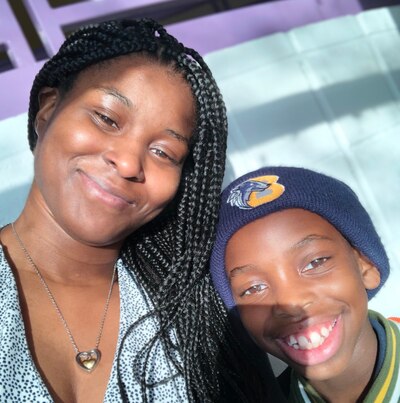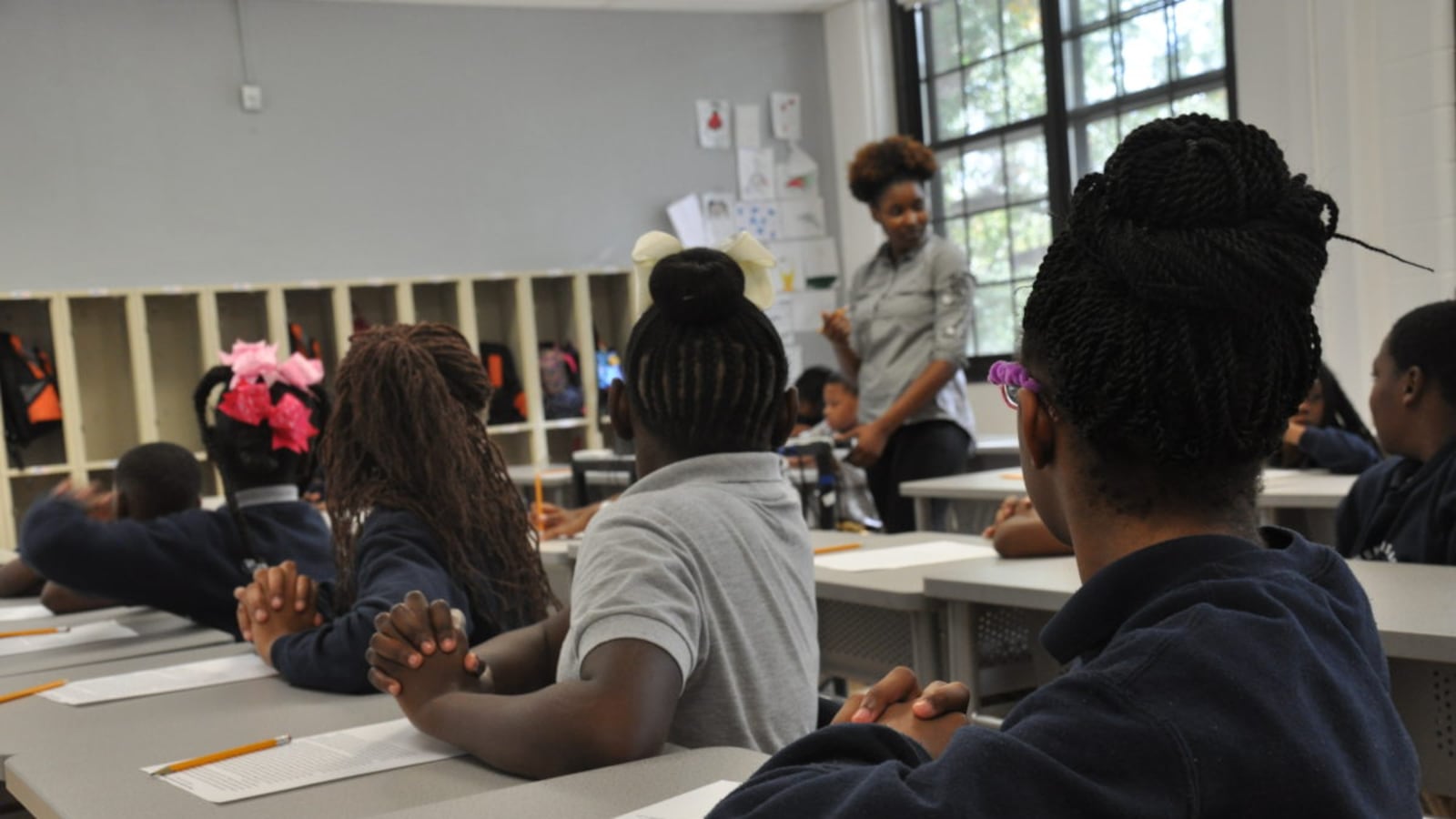Here, in a feature we call How I Teach, we ask educators who’ve been recognized for their work how they approach their jobs. You can see other pieces in the series here.
As a first-year teacher in Memphis, Angelique Hines had a conversation with one of her elementary school students that made a strong impression.

A student at Believe Memphis Academy, a charter school in its first school year, told Hines that he didn’t like her or the school, because it wasn’t “fun.” At his old school, he said, he watched a lot more movies.
“He came in reading on a second-grade level as a fourth-grader,” Hines said. “His idea of school had been full of fun activities and little to no work. … He felt like if we were doing classwork, something was wrong.”
Hines, who teaches fourth and fifth grade, could relate — recalling moving as a teenager to more academically rigorous high school. She said that her own experience and the aforementioned conversation, motivates her to demand a lot of her students.
“This system is hindering kids in ways they are oblivious to,” she said. “Knowledge like this makes my job difficult because a zip code can determine whether you get a real education or a ‘fun’ one.”
We talked with Hines about why she became a teacher, how she gets to know her students, and why she can’t teach without a highlighter. Her interview has been condensed and edited for clarity.
Was there a moment when you decided to become a teacher?
When I first got to college, I recognized the inconsistency and inequity in the educational system. As I began to make friends with students from diverse backgrounds, I recognized the lack of resources and opportunity in certain school districts, primarily those of minority students.
However, what really pulled this all together was a conversation I had with one of my friends. In this conversation, she told me about the courses her middle school offered, like German, ending with the class going on a field trip to Germany. She also talked about college seminars she took in eighth grade. She was preparing for the ACT at the age of 13. Meanwhile, my school had little to no structure, and we didn’t have any language courses. We barely had a discipline system. I remember doing nothing in class, and I still was one of my school’s “top” students. My friend opened my eyes to just how unequal the educational system was, and it was all based on where a student lives.
I felt called to become a part of the solution by enrolling in Teach For America. I needed to change the trajectory of young students who deserve a great education. That all led me to Believe Memphis Academy.
How do you get to know your students?
I knew when I started this role that I wanted to be so much more than a teacher. I wanted to be a mentor, a partner, and a strong role model for my kids so that they knew they could do it for themselves. In the first few weeks of school, I made it a goal to get to know each of my students. Some of my students didn’t trust me at first. Whether it be from a previous bad experience with a teacher or a lack of commitment, they had a hard time recognizing just how much I care.
The one thing I knew to do was stay consistent. Love them no matter what. Give them a consequence, but also debrief with them, so they know you don’t hate them for making a mistake. Doing the small things will make you a teacher your students love.
What object would you be helpless without during the school day?
My highlighter. It’s a tool I use quite frequently from when I check homework in the morning to when I am underlining [important] details in class while modeling for my kids. The kids know when my highlighter comes out, it’s time to find some main details.
What’s something happening in the community that affects what goes on inside your class?
One outside influence that I know of is the Memphis Lift, which is a local grassroots organization that is mobilizing families in our community to demand better from schools. It allows families to make the best decision on where they send their children to school. It also helps our school because being a new school, organizations like this bring us children and parents who want better. It also helps parents advocate for their students in local schools.
Tell us about a memorable time — good or bad — when contact with a student’s family changed your perspective or approach.
At the start of the year, I had a student who was always late for school. Every day he came strolling in at 8:15 [or] 8:20 a.m., and I would always think to myself “Why can’t parents get their kids to school on time?”
I never thought about the challenges his family must be facing; I only made assumptions. One day, I was talking to my school leader about it, and I was told to call home. When I did, his mother revealed to me that she had 5 kids who all went to different schools, and she talked about the difficulty of getting them all to school. I also learned that he had responsibilities to his siblings. This included ensuring his younger siblings got to school before he did.
I made a promise to myself to always assume the best, to understand the challenges that our families may face, and to never write a narrative [of] a situation before I inquire. My school leader and I partnered with the family, and we worked out a way where the bus could come closer to where he lived, so he could make the bus in the mornings. He has not been late since.
What are you reading for enjoyment?
I am currently reading Bird Box for enjoyment. After I finish it, I will be reading The Hate U Give.
What part of your job is most difficult?
The most difficult part about my job is the knowledge I hold about the real world and the injustices that my children have faced in their lives. I remember speaking to a student who admitted that he “hated this school” and missed his “old teacher.” I prompted him by asking “what made her your favorite teacher and memorable?”
He went on to add that she allowed the students to watch movies, allowed them to do “fun” activities in class, and class wasn’t so “boring” and “full of classwork.” He came in reading on a second-grade level as a fourth-grader. And while I didn’t demean his teacher in front of him, it further expressed that this system that they’re in is hindering them, and they don’t even know it. He felt like if we were doing classwork, something was wrong.
His idea of school had been full of fun activities and little to no work. He reminded me of myself when I got to high school. Just like him, I hated my school because it wasn’t “fun.” And while I was reading on grade level, I couldn’t comprehend or draw inferences. But I still yearned for my old school. This system is hindering kids in ways they are oblivious to. Knowledge like this makes my job difficult because a zip code can determine whether you get a real education or a “fun” one. A zip code determines if you will have strong work ethic. A zip code determines how well you can make inferences or comprehend. It lights a fire under me and pressures me to work hard not just for myself but for my kids to ensure that a zip code doesn’t define them.


